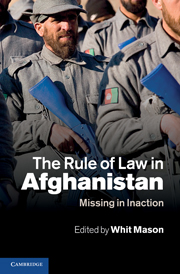Book contents
- Frontmatter
- Contents
- Contributors
- Preface and acknowledgements
- 1 Introduction
- PART I The scope and nature of the problem
- PART II The context
- PART III The political economy of opium
- 7 The Afghan insurgency and organised crime
- 8 Afghanistan's opium strategy alternatives – a moment for masterful inactivity?
- PART IV Afghan approaches to security and the rule of law
- PART V International interventions
- PART VI Kandahar
- PART VII Conclusion
- Index
- References
8 - Afghanistan's opium strategy alternatives – a moment for masterful inactivity?
Published online by Cambridge University Press: 01 June 2011
- Frontmatter
- Contents
- Contributors
- Preface and acknowledgements
- 1 Introduction
- PART I The scope and nature of the problem
- PART II The context
- PART III The political economy of opium
- 7 The Afghan insurgency and organised crime
- 8 Afghanistan's opium strategy alternatives – a moment for masterful inactivity?
- PART IV Afghan approaches to security and the rule of law
- PART V International interventions
- PART VI Kandahar
- PART VII Conclusion
- Index
- References
Summary
No examination of the rule of law in Afghanistan can overlook the fact that the country's largest, most mature industry is illegal. The unprecedented surge in opium price and production following the Taliban poppy ban of 2000–01 has exacerbated corruption at every level of government, as well as partly funding the neo-Taliban insurgency. This chapter explores the alternatives for Western governments' response to the Afghan opium economy, taking into account certain under-emphasised trends and the linked but not fully compatible priorities of counter-insurgency, counter-narcotics and strengthening the rule of law.
The Afghan drug economy: two key trends
Policymakers examining opium in Afghanistan are blessed with an abundance of quantitative and analytical studies, based on extensive field research by UN agencies and independent researchers. Yet many policy briefs and media reports overlook key lessons from this body of work, and orient themselves instead around sensational but misleading narratives.
For example, the Taliban are still widely described as the dominant actors in the traffic, with opium called ‘the economic engine for the insurgency’ (Filkins 2009). Also, many analyses of poppy and alternative livelihoods presuppose opium's overwhelming economic superiority, citing a farm gate price that is unbeatable by anything save (perhaps) a few high-value, exotic crops.
- Type
- Chapter
- Information
- The Rule of Law in AfghanistanMissing in Inaction, pp. 123 - 146Publisher: Cambridge University PressPrint publication year: 2011
References
- 2
- Cited by



